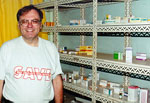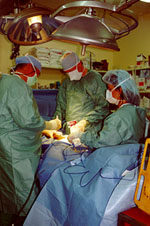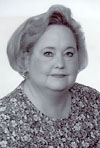Volunteers gain from missions abroad
by Cindy AbolePublic Relations
Chalk one up for experience. Even if that involves practicing one's skills working in some of the world's most impoverished nations.
Today more than ever, MUSC students and staff are reaching out and sharing their talents in medical missions abroad and gaining a lot more in return.
For years, medical, nursing, pharmacy, dental and health professions students have found time in their busy lives to volunteer with international medical mission-related projects. It's part of a growing trend among health care professionals that has also sparked the interest of others who want to volunteer with medical and humanitarian missions through professional organizations, churches and private groups.
“As the country's ever-changing population and general globalization is realized on MUSC's campus, it's only natural that students show more interest and commitment to learn how to meet and understand the health care needs of the world,” said Susan Brooks, director of the Office of International Programs. “I expect that more than 100 individuals from MUSC will participate in international exchange during 2001. The Office of International Programs is here to assist them.”
This year alone, more than 30 MUSC students, faculty and staff have traveled to participate in medical mission trips in Haiti, Ghana, Nicaragua, Costa Rica, Venezuela, Peru, Honduras, Guatemala, Ecuador, the Dominican Republic, Kenya, Nepal, Tanzania and India, according to Brooks.
Second-year medical student Ricky Choi traveled in June to Ghana, Africa to participate in a three-week medical mission trip. Choi, who is co-president for MUSC's chapter of the American Medical Student Association (AMSA), attended on behalf of AMSA and Cross Cultural Solutions, a non-profit humanitarian assistance program that supports volunteer work programs in Ghana, China, India and Peru.
Choi worked in one of three rural health clinics in an agricultural area of Ghana which provides health care to about 2,000 to 4,000 people.
“I wanted to make sure my experience was truly meaningful,” said Choi, who graduated from the University of Chicago's Bachelor of Arts program in the History, Philosophy, and Social Studies of Science and Medicine. “It turned out to be a great opportunity for me to become proactive and expand my medical experience. I learned to understand medicine through different cultures. It has allowed me to think differently and apply creative solutions to solve problems.”
 Pharmacy
professor Wayne Weart helped organize clinic pharmacies while traveling
with two dozen church-related volunteers to Arusu, Tanzania. The group
worked for 10 days assisting communities through construction, medical
and spiritual projects.
Pharmacy
professor Wayne Weart helped organize clinic pharmacies while traveling
with two dozen church-related volunteers to Arusu, Tanzania. The group
worked for 10 days assisting communities through construction, medical
and spiritual projects.
For College of Pharmacy professor Wayne Weart, Pharm.D., getting involved in a medical mission helped to fulfill a high school dream of travel and participation in a missionary trip.
Weart joined two dozen area volunteers who traveled to the troubled African nation of Tanzania in June. The group was organized through St. Matthews Lutheran Church and the non-profit development organization Global Volunteers.
“Through Global Volunteers, our goal was not to impose on the people we helped,” Weart said. “We wanted to promote the desire of a good work ethic among peoples, along with an emphasis on building a relationship with God.”
 Second-year
College of Medicine student Rob Russell, center, assists his father, Dr.
Earle Russell, a Spartanburg surgeon, during a procedure in the Dominican
Republic. The Russells were part of a recent medical mission team sponsored
by the Christian Medical Dental Society and Solid Rock Missions.
Second-year
College of Medicine student Rob Russell, center, assists his father, Dr.
Earle Russell, a Spartanburg surgeon, during a procedure in the Dominican
Republic. The Russells were part of a recent medical mission team sponsored
by the Christian Medical Dental Society and Solid Rock Missions.
Weart's team consisted of pastors, nurses, a dental hygienist and other area volunteers. The group participated in construction projects and provided limited health care to the needy in certain areas. They soon learned that most of the Tanzanian population suffers from diabetes, malaria, TB, HIV and other infectious diseases.
“It was frustrating knowing that there are simple things that exist in today's world that can help these people,” said Weart said, referring to simple antibiotics and pharmaceuticals used in the 1960s. “It has been a life-changing experience for me. Each day I'm reminded of how we easily take things for granted in America.”
First-year physician assistant student Michael Overcash is no stranger to international relief trips. Overcash has traveled to more than 50 countries in the past six years, many of them as a Spanish language interpreter working with international mission groups. So when he returned to Nicaragua as a medical relief person associated with the organization, God's Ministries International, he felt very comfortable aiding volunteer physicians, nurses and other personnel servicing needy children of all ages.
“Most importantly, I've learned to treat people with the same care and respect as others—no matter who they are,” Overcash said. “It's important that people leave our care with a sense of dignity and self-worth. Sometimes people just need to know that their lives really matter and that they are loved.”
For information about medical mission visit <http://www.musc.edu/related/international/index.htm>
International programs promotes exchange
Since 1996, the Office of International Programs has assisted more
than 5,500 students, faculty and staff with language support, visa and
immigration information, resources for educational and research exchanges
and travel advisories.
Each year, MUSC's University Affairs Committee receives numerous sponsorship requests from students seeking involvement in international educational and research exchanges.
Earlier this spring, the Office of International Programs and Services received approval from the Health Science Foundation to establish the International Education and Research Fund. The fund was created to assist MUSC students and researchers with travel grants to participate in medical exchange and study abroad. The new fund is among 300-plus funds offered through the Health Science Foundation and annual Yearly Employee Support (YES) campaign to assist funding for patient care, education and research programs of MUSC.
 Susan
Brooks
Susan
Brooks
“Once a student has participated in an international exchange, their lives become changed,” said Susan Brooks, coordinator of the Office of International Programs. “Students learn to practice patient care in some of the most simple, yet primitive clinical environments. Through missions, they learn to overcome these challenges and other barriers that will help make them better professionals. The funds received through donations to the MUSC YES Campaign and International Education and Research Fund will provide small travel scholarships.”
Since 1994, Brooks and her staff have actively prepared students who participate in international medical exchanges. In September, the office sponsored an informal gathering of about a dozen medical mission participants and more than 30 interested students, faculty and staff. This World Affairs Discussion Group allowed individuals to talk with others, exchange information and learn about various programs affiliated with medical mission teams.
“Meeting with other students in this manner was really inspirational,” said Michael Overcash, a first year physician assistant student who recounted his summer mission trip to Nicaragua. “It shouldn't matter whether you're a nurse, physician assistant, pharmacy, dental or medical student. Mixing everyone and working together is the way it ought to be.”
The office has also responded to various student requests by offering
Medical Spanish courses which are now taught in basic, intermediate and
advanced levels. Other student support includes
assistance with the creation of a Spanish language conversation group,
Mesa Espanola. Brooks also supports the elective course, Introduction to
International Studies, taught by Bert Keller, D.Min., associate professor
of Ethics, Department of Family Medicine. These and other activities have
contributed to preparing students for participation in international medical
missions or clinical rotations.
Brooks wants to continue helping students and staff by offering resources
and answering questions regarding travel abroad. She and international
advisor Emily Brown have created a vast reference library on every worldwide
country. They have also established a database of all international students,
faculty and staff on campus. Currently, the program is undergoing a facelift
or
renovation as with other offices housed at the Harper Student Center.
Its result will yield additional space for their office including a student
work area for international exchanges. They operate in conjunction
with MUSC's University International Affairs Committee.